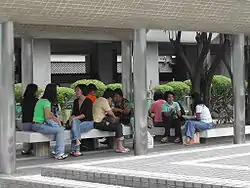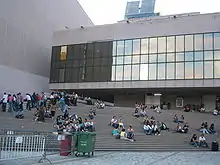Filipinos in Hong Kong
Filipinos constitute the largest ethnic minority in Hong Kong, numbering approximately 130,000,[2] many of whom work as foreign domestic helpers.[3]
| Demographics and culture of Hong Kong |
|---|
| Demographics |
| Culture |
| Other Hong Kong topics |
| Part of a series on |
| Ethnicity in Hong Kong |
|---|
| Total population | |
|---|---|
| 140,000 1.95% of Hong Kong's population | |
| Regions with significant populations | |
| Wan Chai District[1] | |
| Languages | |
| English, Cantonese, Filipino | |
| Religion | |
| Christianity (Roman Catholic) |
Employment demographics
Although Filipino domestic workers outnumber other Filipinos in other professions, there are also many Filipino professionals in Hong Kong, including architects and civil engineers working on prominent buildings and construction projects in Hong Kong, IT professionals, and those working in professional services (accounting, culinary, dentistry, design, finance, law, music, pastoral ministry). Many Filipinos employed as domestic workers in Hong Kong previously had other professions in the Philippines, or are university educated and working in Hong Kong because of better financial opportunities.[4] In 2001, the Hong Kong's Census and Statistic Department survey founded over half, 54.8%, of Filipino domestic workers hold a secondary degree.[5]
The first Filipinos to work in Hong Kong were those who went to Hong Kong after World War II, and following the fall of Mainland China to the Communists in 1949. Many Filipinos also work in service industries in the Central business district,, or as entertainers in Hong Kong Disneyland.[4]
The Eastern District has the highest concentration of Filipino residents in Hong Kong, with 3.24% of the district's population being of Filipino descent (14,596 people).[6]
Community life


Language
Most Filipinos in Hong Kong communicate with the local population in English, usually a second language for both parties. According to the Hong Kong's Census and Statistic Department, approximately 11% of Filipino domestic workers speak Cantonese as well.[7] Within the Filipino community in Hong Kong, they communicate in Tagalog or in another Philippine language.
Commerce
The World-Wide House arcade in Central is popular with Filipinos, as many of the shops inside the building are run by Filipinos.
Entertainment
On Sundays, large numbers of Filipino maids often gather at various spots in Central, such as the ground floor of the HSBC Hong Kong headquarters building, as for many maids in Hong Kong Sunday is their fixed once-a-week working day off, during which they socialise, eat and sing together, or sell various items. These Sunday gatherings have been called "Little Manila"[8]
Religion
Most Filipinos in Hong Kong are Christians, the majority Roman Catholic. There are also a significant number who congregate in Protestant and non-denominational churches. A minority are Muslims or Buddhists. Many attend Mass and various church services on Sunday mornings at the numerous Catholic parishes in Hong Kong offering services in Tagalog or English. According to the Roman Catholic Diocese of Hong Kong (2011), there are an estimated 120,000 Filipino Catholics making up a large part of the non-local parish membership.[9]
Aside from the Catholics, there are congregations of Filipino Protestants who attend services in Baptist, Methodist and Presbyterian churches. There is also a full fellowship of Aglipayans or members of the Iglesia Filipina Independiente (Philippine Independent Church) that attend mass at the St John's Cathedral in Central, an Anglican church. The Filipino chaplain is Reverevend Dwight Dela Torre.[10]
In past 30 years, Filipino evangelical Christians have grown in numbers, especially in such fellowships as Jesus is Lord (JIL), which number in the tens of thousands.[11]
Notable people
- Michael Campion, footballer
- Robbie Capito, pool player
- Rita Carpio, singer
- Teresa Carpio, singer
- Steven Dominique Cheung, pilot and politician
- Nicholas Choi, fencer
- Crisel Consunji, actress
- Agatha Kong, singer
- Felice Lieh-Mak, professor
- Sarah Meier, VJ
- Alex To, singer
- Janice Vidal, singer
- Jill Vidal, singer
See also
- Vallejos v. Commissioner of Registration, a Filipina maid's right of abode case
- Comilang v. Commissioner of Registration, a visa denial case by a Filipina maid with a Hong Kong permanent resident daughter
References
- District Profiles, Hong Kong Census, 2011, retrieved 27 September 2013
- mentioned in review "My Filipino one and only" Reese Deveaux Archived 29 June 2011 at the Wayback Machine The Standard, 18 September 2004
- Chu, Kathy (16 November 2013). "Hong Kong's Filipino Community Reaches Out to Typhoon Survivors". Wall Street Journal. Retrieved 11 November 2013.
- Odine de Guzman (October 2003). "Overseas Filipino Workers, Labor Circulation in Southeast Asia, and the (Mis)management of Overseas Migration Programs". Kyoto Review of Southeast Asia (4). Archived from the original on 4 May 2007. Retrieved 18 March 2007.
- "Press Release (2 Jan 2001) :Survey on ethnic minorities in Hong Kong released | Census and Statistics Department". www.censtatd.gov.hk. Retrieved 28 December 2020.
- 2011 Population Census IDDS Report, Hong Kong Census
- "Press Release (2 Jan 2001) :Survey on ethnic minorities in Hong Kong released | Census and Statistics Department". www.censtatd.gov.hk. Retrieved 28 December 2020.
- Law, Lisa (July 2001). "Home Cooking: Filipino Women and Geographies of the Senses in Hong Kong". Ecumene. 8 (3): 264–283. doi:10.1177/096746080100800302. ISSN 0967-4608. S2CID 55629552.
- HKCSO (2011) Statistics of the Diocese of Hong Kong, 31 August, [Online], Available: "Archived copy". Archived from the original on 2 January 2014. Retrieved 13 February 2017.CS1 maint: archived copy as title (link). Accessed 12 June 2012.
- News, Team (15 August 2013). "IFI Hong Kong Celebrates Church's 111th Anniversary". HKPinoyTV. HKPinoyTV. Retrieved 15 August 2013.
- Video, Team (10 July 2015). "Thousands celebrate Jesus is Lord (JIL) Hong Kong 30th anniversary". HKPinoyTV. HKPinoyTV. Retrieved 10 July 2015.
External links
| Wikimedia Commons has media related to People from the Philippines in Hong Kong. |
